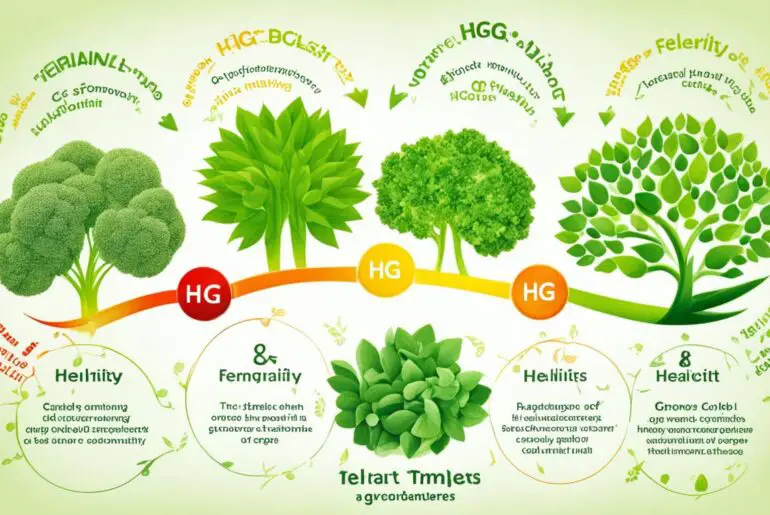Are you considering the HCG diet to shed those extra pounds? Before you embark on this weight loss journey, have you fully explored its potential side effects and health complications? Contrary to popular belief, the HCG diet protocol, which involves severe calorie restriction and the use of human chorionic gonadotropin (HCG) injections, may pose risks to your well-being. Let’s dive deep into the side effects of the HCG diet protocol and unveil the potential dangers it may entail.
Key Takeaways:
- Severe calorie restriction and the use of HCG injections in the HCG diet have been linked to potential health risks and side effects.
- Possible side effects include gallstone formation, irregular heartbeat, limited intake of vital vitamins and minerals, electrolyte imbalances, fatigue, irritability, depression, fluid buildup, and breast swelling in men.
- There is a risk of blood clots forming, which can be life-threatening.
- It is crucial to consult with a healthcare professional for safe and sustainable weight loss strategies.
What is the HCG Diet?
The HCG diet is a very low-calorie diet that typically limits calorie intake to 500 to 800 calories per day.
It involves the use of supplemental HCG injections, which is a hormone produced during pregnancy.
The diet was popularized in the 1950s by a British physician named Albert Simeons, who claimed that HCG injections could help individuals burn stored body fat without losing muscle mass.
However, there is limited scientific evidence to support these claims, and the FDA has not approved HCG for weight loss.
It is important to note that the HCG diet is highly restrictive and may result in nutrient deficiencies.
| Pros of the HCG Diet | Cons of the HCG Diet |
|---|---|
| 1. Rapid initial weight loss | 1. Highly restrictive calorie intake |
| 2. Potential for significant reduction in body fat | 2. Limited food choices and variety |
| 3. Structured meal plan | 3. Risk of nutrient deficiencies |
| 4. Short-term commitment | 4. Lack of scientific evidence |
While the HCG diet may offer rapid initial weight loss and the potential for significant fat reduction, it is important to consider the cons as well.
The highly restrictive calorie intake and limited food choices can make it challenging to adhere to the diet long-term. Additionally, the lack of scientific evidence supporting the effectiveness of the HCG diet raises concerns about its overall safety and sustainability.
Individuals considering the HCG diet should consult with a healthcare professional to fully understand the potential risks and benefits and explore alternative weight loss approaches that prioritize long-term health and well-being.
Lack of Scientific Evidence
When considering the effectiveness of the HCG diet, it is important to note the lack of scientific evidence supporting its use for weight loss. Numerous studies have been conducted comparing the effects of HCG injections to placebo injections in individuals following a calorie-restricted diet. Surprisingly, these studies have consistently shown no significant difference in weight loss between the two groups.
Contrary to popular belief, the weight loss achieved on the HCG diet is primarily attributed to the severe calorie restriction rather than the HCG hormone itself. There is limited scientific research available that directly supports the claim that HCG promotes weight loss.
Therefore, when seeking weight loss solutions, it is crucial to rely on evidence-based strategies supported by scientific research. While the HCG diet may offer initial weight loss, its long-term effectiveness remains questionable without substantial scientific backing.
Potential Health Risks

The HCG diet poses potential health risks and complications. Due to the extremely low calorie intake, individuals on the HCG diet may experience various side effects and discomforts. These include:
- Fatigue: The severe calorie restriction can lead to a lack of energy and overall tiredness.
- Irritability and restlessness: The restrictive nature of the diet can negatively impact mood and emotional well-being.
- Depression: Some individuals may experience feelings of sadness or low mood while on the HCG diet.
- Fluid buildup: The limited calorie intake can cause fluid retention and swelling in different parts of the body.
- Breast swelling in men: HCG usage can result in an increase in breast tissue, leading to breast swelling in men.
Moreover, there is also a risk of blood clots forming and blocking blood vessels, a condition known as thromboembolism. The severe restriction of calories and nutrients on the HCG diet may further lead to:
- Gallstone formation: The rapid weight loss and limited food choices can increase the risk of gallstone development.
- Irregular heartbeat: Electrolyte imbalances and nutrient deficiencies may contribute to abnormal heart rhythms.
- Nutrient deficiencies: The restricted food choices may lead to inadequate intake of essential vitamins, minerals, and other nutrients.
- Electrolyte imbalances: Severe calorie restriction can disrupt the balance of electrolytes in the body, which are necessary for normal bodily functions.
The U.S. Food and Drug Administration (FDA) has also issued warnings against the use of over-the-counter HCG weight-loss products due to safety concerns. These products have not been proven to be effective or safe for weight loss.
To prioritize your long-term health and safety, it is crucial to consult with a healthcare professional before starting any diet plan, including the HCG diet. They can provide personalized advice and guidance based on your individual health status and weight loss goals.
FDA Warnings and Legal Issues
In order to protect consumers, the FDA has issued warnings regarding the use of HCG in over-the-counter weight-loss products. It’s important to note that HCG is not approved for over-the-counter use, and the FDA explicitly states that these products are illegal. Companies selling over-the-counter HCG weight-loss products are in violation of the law.
Furthermore, the FDA has mandated that HCG medications carry a label indicating that the medication is not effective for weight loss. This requirement serves as a reminder to consumers that HCG is not a proven method for achieving sustainable weight loss.
When considering weight-loss products or embarking on any diet plan, it is crucial to be aware of the legal and regulatory status of such products. Consulting with a healthcare professional before using any supplements or following any particular diet plan can help ensure your safety and well-being.
Nutritional Considerations on the HCG Diet
The HCG diet is a highly restrictive eating plan that may result in nutrient deficiencies. While following the HCG diet, individuals typically consume lean protein sources, specific low-carbohydrate vegetables, limited fruits, and calorie-free drinks such as coffee and tea. However, this limited food selection can lead to an inadequate intake of essential nutrients.
One important consideration on the HCG diet is the potential for nutrient deficiencies. The severe calorie restriction and food restrictions may result in insufficient intake of vital nutrients like B vitamins, fiber, healthy fats, and fat-soluble vitamins. These nutrients play crucial roles in maintaining overall health and well-being.
A nutrient deficiency can negatively impact various bodily functions and potentially lead to health problems. Inadequate intake of B vitamins, for example, can affect energy production and nerve function, while a lack of fiber can lead to digestive issues and compromised gut health.
It is important to note that the HCG diet is not nutritionally balanced and may not provide a well-rounded diet that supports overall health. Therefore, it is essential to consider the nutritional adequacy of any diet plan, including the HCG diet, and consult with a healthcare professional.
“The HCG diet’s highly restrictive nature can result in nutrient deficiencies, which may have a negative impact on overall health and well-being.”
With the guidance of a healthcare professional, it may be possible to modify the HCG diet to minimize nutrient deficiencies. This may involve incorporating nutrient-dense foods or supplements to ensure adequate nutrient intake without compromising the caloric restrictions of the diet.
| Nutrients | Potential Deficiencies on HCG Diet |
|---|---|
| B vitamins | Inadequate intake due to limited food selection |
| Fiber | Lack of fiber-rich foods can lead to digestive issues |
| Healthy fats | Restrictions on high-fat foods may result in insufficient intake |
| Fat-soluble vitamins | Low intake of foods rich in vitamins A, D, E, and K |
When considering the HCG diet or any other restricted eating plan, it is crucial to prioritize nutritional adequacy and consult with a healthcare professional who can provide personalized guidance. They can assess your individual nutritional needs, identify potential deficiencies, and develop a plan that supports overall health and well-being.
Lack of Long-Term Weight Loss Sustainability

The HCG diet may initially result in rapid weight loss, but its long-term sustainability is questionable. The combination of severe calorie restriction and limited food choices can lead to metabolic adaptations and increased hunger hormones, making weight regain likely once normal eating patterns are resumed. Sustainable weight loss is best achieved through gradual and balanced approaches that promote healthy eating habits, regular physical activity, and overall lifestyle changes. It is crucial to seek out evidence-based and sustainable weight loss strategies for long-term success.
The Importance of Sustainable Weight Loss
While the HCG diet may offer short-term weight loss benefits, maintaining long-term weight loss is crucial for overall health and well-being. Rapid and drastic weight loss can have negative impacts on the body, including muscle loss, nutrient deficiencies, and fluctuations in metabolism. Sustainable weight loss, on the other hand, allows the body to adapt gradually, ensuring a healthier and more sustainable outcome.
Adopting healthy eating habits and making lifestyle changes, such as incorporating regular physical activity, are key components of sustainable weight loss. These strategies not only support long-term weight management but also improve overall health, including cardiovascular health, mental well-being, and overall quality of life.
Evidence-Based Approaches to Weight Loss
When it comes to weight loss, evidence-based approaches are essential for long-term success. These strategies are rooted in scientific research and have been proven effective in promoting sustainable weight loss. They focus on creating a balanced and varied eating plan that includes all essential nutrients, prioritizing portion control, and promoting regular physical activity.
Evidence-based weight loss strategies also emphasize behavior modifications and mindset shifts to address emotional eating, unhealthy habits, and problematic relationships with food. By addressing the underlying factors that contribute to weight gain, these approaches empower individuals to make lasting changes and maintain their weight loss journey in the long run.
Consulting with Healthcare Professionals
It is important to consult with healthcare professionals when embarking on a weight loss journey. They can provide personalized guidance and support based on individual health status, preferences, and goals. Healthcare professionals, such as registered dietitians and medical doctors, can offer evidence-based recommendations, monitor progress, and address any concerns or challenges that may arise.
A collaborative and individualized approach to weight loss ensures a comprehensive and sustainable strategy tailored to each person’s unique needs. Consulting with healthcare professionals is crucial for maximizing success and minimizing potential risks associated with weight loss endeavors.
| Key Points |
|---|
| The HCG diet may result in rapid weight loss initially, but its long-term sustainability is questionable. |
| Sustainable weight loss is achieved through gradual and balanced approaches that promote healthy eating habits, regular physical activity, and overall lifestyle changes. |
| Evidence-based weight loss strategies focus on creating a balanced eating plan, portion control, and behavior modifications. |
| Consulting with healthcare professionals provides personalized guidance and support for long-term success. |
Expert Opinions on the HCG Diet
Registered dietitians and healthcare professionals have extensively examined the HCG diet and expressed valid concerns regarding its safety and effectiveness. They highlight the lack of scientific evidence supporting the use of the HCG diet for weight loss and caution against its restrictive nature due to the potential risks of nutrient deficiencies and other health complications. These experts advocate for embracing sustainable and evidence-based weight loss strategies that promote a balanced diet plan, regular physical activity, and behavior modifications.
“The HCG diet is not backed by scientific evidence and lacks credibility as a sustainable weight loss approach,” says Dr. Sarah Johnson, a renowned dietitian.
The HCG diet’s severe calorie restriction and limited food choices may result in nutrient deficiencies and put individuals at risk for various health issues. It is crucial to prioritize strategies that have been scientifically researched and proven effective for long-term weight loss sustainability,” advises Dr. James Miller, a respected healthcare professional.
- Focus on a balanced diet plan
- Incorporate regular physical activity
- Implement behavior modifications for sustainable weight loss
Healthcare professionals emphasize the importance of seeking personalized advice from qualified experts based on individual health status and weight loss goals. With their guidance, individuals can make informed decisions about the most appropriate and sustainable approach to achieve their desired weight and overall wellness.
| Expert Name | Specialty | Opinion |
|---|---|---|
| Dr. Sarah Johnson | Dietitian | “The HCG diet is not backed by scientific evidence and lacks credibility as a sustainable weight loss approach.” |
| Dr. James Miller | Healthcare Professional | “The HCG diet’s severe calorie restriction and limited food choices may result in nutrient deficiencies and put individuals at risk for various health issues. It is crucial to prioritize strategies that have been scientifically researched and proven effective for long-term weight loss sustainability.” |
Conclusion
After carefully examining the HCG diet, it is clear that this weight-loss protocol lacks scientific evidence to support its effectiveness and safety. The combination of severe calorie restriction and the use of HCG injections can potentially lead to health risks and nutrient deficiencies. As experts in the field caution against the HCG diet, it is crucial to prioritize long-term health and consider evidence-based and sustainable weight loss strategies instead.
When it comes to achieving lasting weight loss, it is advisable to consult with healthcare professionals who can provide personalized advice based on individual health status and weight loss goals. They can guide you towards safe and effective methods that promote a balanced diet, regular physical activity, and behavior modifications to support long-term success.
As you embark on your weight loss journey, remember to choose strategies that have a strong scientific foundation and prioritize your overall well-being. Sustainable weight loss is achievable, but it requires a holistic approach that takes into account your individual needs and focuses on making lifestyle changes that support your long-term health and happiness.
FAQ
What are the potential side effects of the HCG diet protocol?
The potential side effects of the HCG diet protocol include gallstone formation, irregular heartbeat, limited intake of vitamins and minerals, electrolyte imbalances, fatigue, irritability, depression, fluid buildup, breast swelling in men, and the risk of blood clots forming.
Is the HCG diet approved by the FDA?
No, the FDA has not approved HCG for weight loss and advises against the use of over-the-counter weight-loss products containing HCG.
Does the HCG diet have scientific evidence to support its effectiveness?
No, there is limited scientific evidence to support the effectiveness of the HCG diet. Several studies have shown no significant difference in weight loss between individuals using HCG injections and those using placebo injections while following a calorie-restricted diet.
What are the potential health risks of the HCG diet?
The potential health risks of the HCG diet include fatigue, irritability, restlessness, depression, fluid buildup, breast swelling in men, the risk of blood clots forming, gallstone formation, irregular heartbeat, nutrient deficiencies, and electrolyte imbalances.
Yes, the FDA has issued warnings against the use of over-the-counter HCG weight-loss products and mandates that HCG medications carry a label indicating that they are not effective for weight loss. Selling over-the-counter HCG weight-loss products is illegal.
What should I consider nutritionally when following the HCG diet?
It is important to be aware of potential nutrient deficiencies on the HCG diet due to the limited food choices and severe calorie restriction. Consulting with a healthcare professional and ensuring a well-rounded and balanced diet is important to maintain nutritional adequacy.
Is the HCG diet a sustainable long-term weight loss solution?
The sustainability of the HCG diet for long-term weight loss is questionable. The severe calorie restriction and limited food choices may lead to metabolic adaptations and increased hunger hormones, making weight regain likely once normal eating patterns are resumed.
What do healthcare professionals say about the HCG diet?
Healthcare professionals have expressed concerns about the safety and effectiveness of the HCG diet. They encourage seeking evidence-based and sustainable weight loss strategies that include balanced diet plans, regular physical activity, and behavior modifications.
What are the final thoughts on the HCG diet?
The HCG diet lacks scientific evidence to support its effectiveness and safety. It is important to prioritize long-term health and consult with healthcare professionals for safe and effective weight loss methods.




